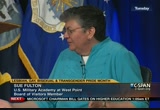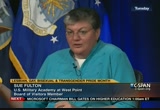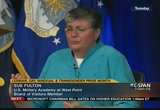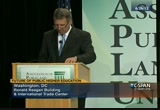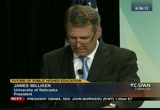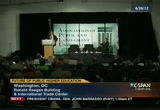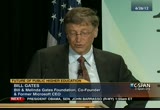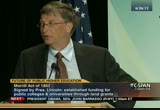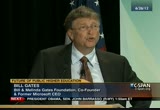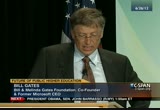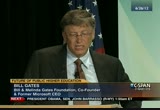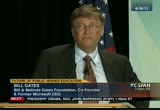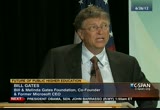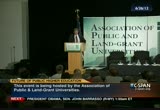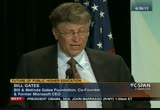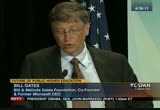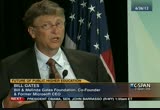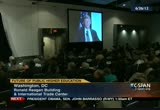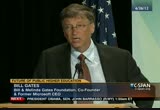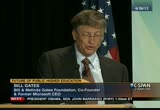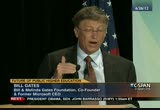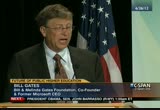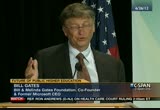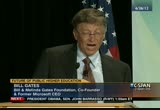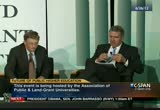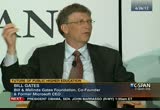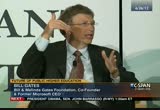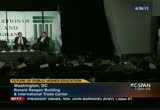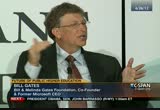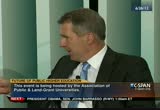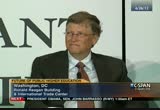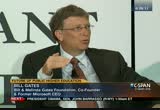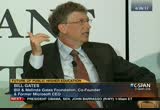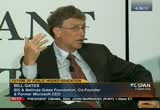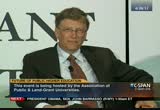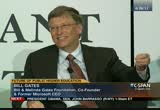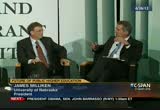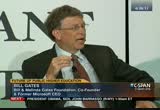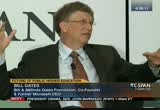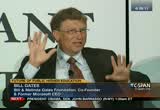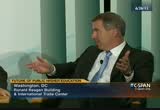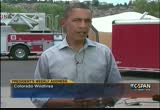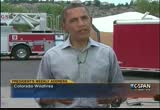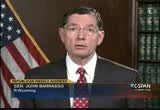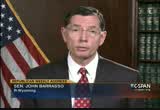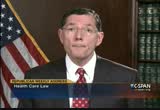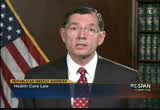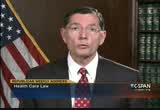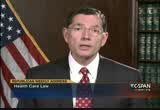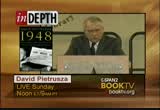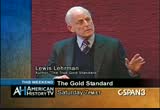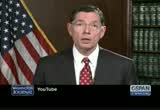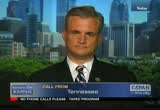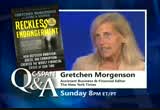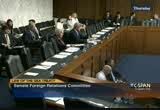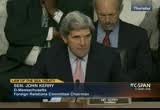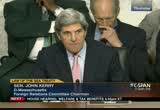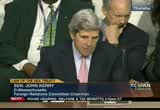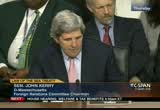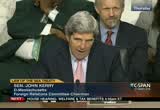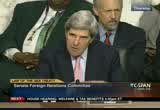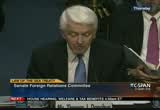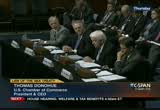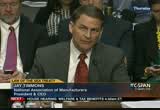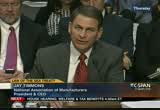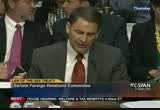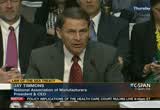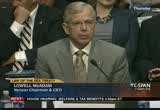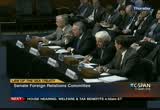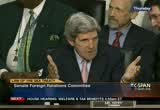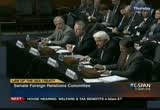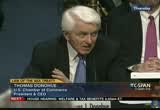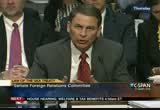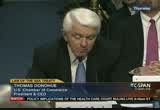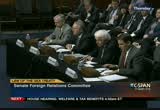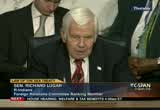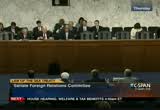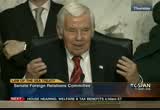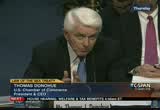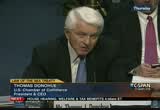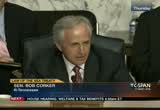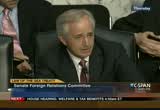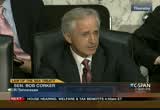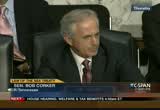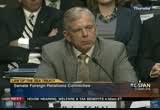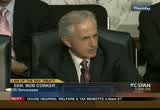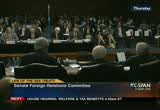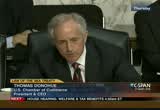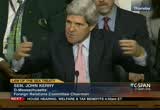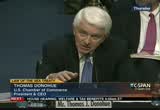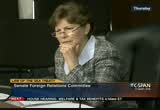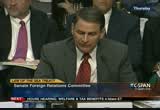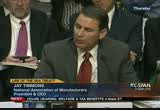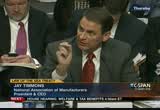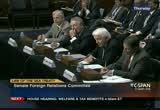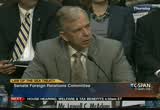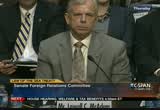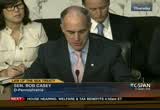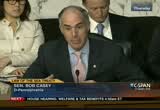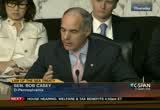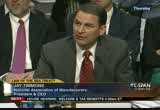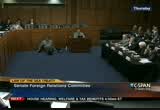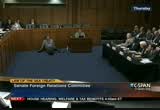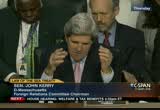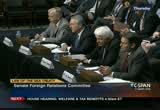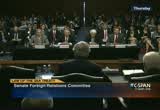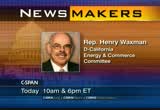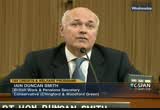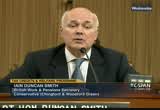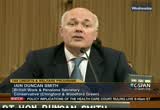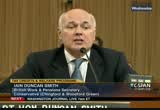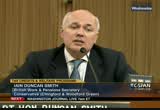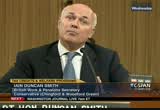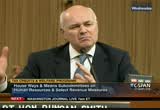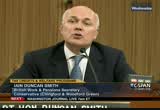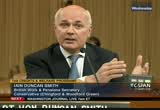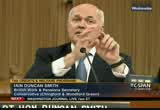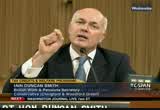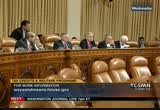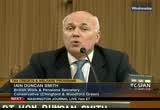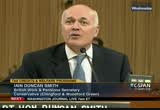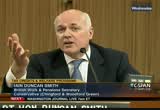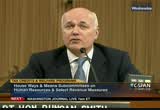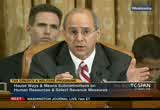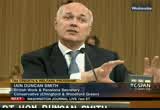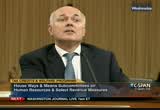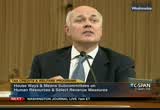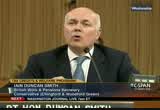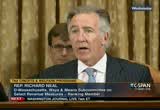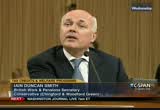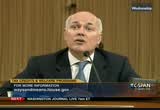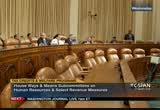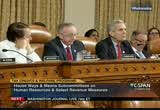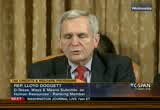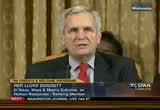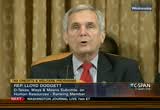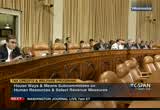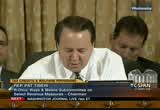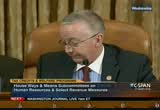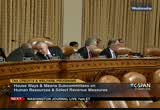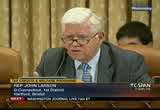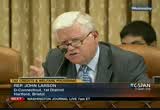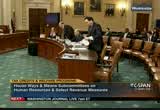tv Washington This Week CSPAN July 1, 2012 1:00am-5:59am EDT
1:00 am
for impact and it was not even a speed bump. to repeal. our students, the cadets, shipman, they had this preparation of going through high school with gay and lesbian kids. i think it is much less of an issue with this generation. it is not even a speed bump at west point. on the visitors, it has not been an issue. we have bigger fish to fry to handle at west point. but i do not want that to be taken as something we have said, and that this generation that is coming up now, they are the ones to get this. it is the older folks. i cannot tell you how many stories that i have seen where they are talking about cursty
1:01 am
-- srusty old sergeant major, but of anybody gives you crap you come and see me. or chaplains. this past weekend, i met not only the navy lieutenant young air force sergeant to get wedded, she was wonderful, beaming the whole time. to me, more importantly, in the back of the church was another chaplin. southern baptist. i asked him why he was there and he said i want to make sure everything goes smoothly. i just want to make sure there are not any problems. you know, there are a lot of people who are senior who are allies to get this, that this is about readiness, taking care of
1:02 am
our troops and mission accomplishment. getting this unfinished so this is never an issue again is so important. i know how i have jumped off the topic of the academies but they are doing great. they have no problems. [applause] >> ladies and gentlemen, we have crept past the hour of to o'clock. so it is my responsibility and my honor to thank our three panelists and two thank you for being in a standing-room-only audience and the pentagon for this event. thank you. have a good afternoon. [captioning performed by national captioning institute] [captions copyright national cable satellite corp. 2012]
1:03 am
>> next, bill gates on the value of higher education. then weekly addresses with president obama and wyoming senator john barrasso. then rob andrews on the supreme court's ruling. a ranking member of the energy and commerce committee talks about the supreme court's decision and what is next as republican leaders pledged to repeal the law. "newsmakers"on c-span. >> next weekend, head to the state capital named in offer of thomas jefferson with " tv in
1:04 am
jefferson city, missouri. former senator and first lady jean carnahan on family life inside the governor's mansion from her book "if walls could talk." also a provisions list from ancient mesopotamia to the university of missouri, the stories behind eight tablets. and sunday at 5:00 p.m., on american history tv -- >> at one time in 1967, this was called the bloodiest 47 acres in america. >> a ward and take you to the state penitentiary and walked back to history. once a month, c-span explores the history and literary life of cities across america. next weekend from jefferson city. saturday at noon and sunday at 5 eastern on the c-span2 adnd 3.
1:05 am
>> bill gates says the u.s. higher education system has always been a strength for our nation and urged people to make it better for future generations. he was the keynote speaker and an event to mark the upcoming 150th anniversary of the law establishing funding for public colleges and universities through federal land grants. this is 50 minutes. >> we immediately agreed on a first choice, bill gates. someone who would not only help us recognize and celebrate the last 150 years, but challenge us and work with us in the decades ahead. together with his wife, they co- chair the bill and melinda gates educational foundation. it works to expand opportunities for people around the globe.
1:06 am
there foundation is the leader in efforts to improve global health, alleviate poverty, and expand opportunities for women. and with particular significance today, increased access to and success in education. their efforts which span the globe are truly exciting. the work of the gates foundation is built on a simple premise, that all lives medical value. that powerful statement resonates -- that all lives have equal value. that powerful statement resonates with all of us. it has extended its educational and economic opportunities to millions. it is involved in many of the same endeavor is that many of our land grant universities are. through not only its funding, but also its thoughtful approach to philanthropy, the gates foundation is a valued partner of american universities and others committed to
1:07 am
improving the human condition. we could not have a more committed and passionate ally in these pursuits. i know all of us respect and admire greatly with bill gates has devoted his wealth and his life to and we're delighted to welcome him to this celebration. join me in welcoming bill gates. [applause] >> thank you. i am grateful for your invitation to address the aplu on this special day and to express my gratitude, i brought this with me.
1:08 am
this egg is helping lift 10 million people out of poverty. farmers in central and west africa will grow black eyed peas. i unfortunately weevils destroy half the crops after their harvested during the time it is stored. or they didn't tell researchers at purdue university developed this nylon bag. it increases the poor farmer's income by 25%. [applause] that is a good example of one of the many partnerships our foundation has with aplu members across the country.
1:09 am
you create knowledge, not just for its own sake, but to improve people's lives. on behalf of our foundation, i want to thank you for that. today i want to focus on the one thing you do that is even more important and that is providing greater education to almost 5 million students. the moral act created a system of public colleges to "promote the liberal and practical education of the industrial class's." there were to do you prefer your ideas in a single sentence. first that higher education should be both liberal and practical, that it should address society's needs and, second, that all people should have the opportunity to obtain
1:10 am
it. these two ideas amounted to a brand new vision for higher education based on the conviction that a bigger and more diversity group of well- educated people would be an asset to our democracy and a boon to our economy. this vision power of america's economic dynamism for more than a century. your graduates helped build a prosperous country. recently though, education advocates have been looking at the international competitors and what we see there is that other countries have seen what the u.s. did well. we built a system of the colleges and come in many respects, they are copying what we did. and in some respects, on areas of completion rates, some of those countries are doing even better than we have done.
1:11 am
what does this to me is that we need to double down. we need to take this phenomenal asset that has benefited the world and make it even better. there should be no doubt about our starting point. we're still by far, when it comes to research, teaching and learning, at top universities the very best in the world. however, two major trends in higher education are guiding us down a path that may lead us away from these historical commitments to equity and opportunity. first, there is the financial constraints. in the past generation, state funding for students has fallen by 25%. i don't need to tell you that. this is something that you face every day. the fiscal crisis has accelerated this trend. in just the past five years, for example, my home state of
1:12 am
washington has cut funding for higher education by 17%. as a result of this and the steadily rising cost of running our own institutions, the financial burden of college has been shifting to students. they now pay an average of $45,000 out of pocket for four years of public schools. federal money has helped bridge the gap for a while. federal spending on higher education has gone up quite a bit. the stimulus package helped the state budgets for a number of years, but now those dollars have largely come to an end. the pell program alone has doubled in more than a decade. but it is not on a sustainable trend. we look back to 2014. there is an $8 billion funding gap just a for the pell program
1:13 am
alone. so that is one program that is threatened. another trend that is troubling is the path of moving toward higher and higher status or exclusivity period when "the u.s. news" rankings come out, they show how it selected your. -- how selective you are. they look at credentials faculty, the amount you spend and subjective impressions of academic reputation. so these measures are standing in a way of having real measures of effectiveness that we really need to root what best practices are and continue to benefit from the best work that all of you do. i'm understand these incentives
1:14 am
are hard to get around. zero-ere's the sense of sum competition in an exclusivity. acceptance rates at many universities now rate at 50%. and that doesn't count the large number of students who do not bother applying because they know that the bar for admission has continued to go up and up. in short, fewer people of those who want to attend the university are getting in. and those who do get in are paying more. this is a big challenge. it cannot continue if we all have a goal of fulfilling that mission of providing broad education.
1:15 am
we have to look at how we can reverse both spirals. we have to lead in as many people as can be successful educated and they have to get that education at the lowest possible cost. accredited universities can boast about their selectivity if they choose to do so, but a public institution, it should be equity and excellence. so it does not a point of high status to keep students out, but rather high status in letting them in an even having students who have not have the highest high school education or the best s.a.t. scores and giving them a high-quality education. so today is a great day to pause and look at this group for leadership. you can steer your universities out of these trends by making
1:16 am
innovation and priority to the sectors you lead. 106 years ago, your predecessors started a new conversation about the purpose of higher education. you can start the conversation now about what is required to continue serving that conversation appeared how can we get more public funds? unfortunately, in the regionally near term, there will not be much institutional money. the rising share of both state and federal budgets committed to health care broadly defined leaves very little room for flexibility. the mathematics are quite brittle. and whether there is more money or less money in the long term, we should also focus on the challenge of figuring out how to use it best, particularly the money devoted to financial aid.
1:17 am
how do we take it and get better results for students? i think there are two principles we are keeping in mind. the first is that aid should be structured to provide incentives to raise completion rates, incentives to raise income and employment of the graduates. if we look at just completion rates, and the graduation rate for aplu institutions is just a little less than 40%. for the students who are not succeeding, who wind up with a lot of debt, attracting those students, understanding what is going on to them should be more important. perhaps aid should be tied to institutional practices that create this incentive to adopt the practices that have been
1:18 am
seen at the best institutions to boost graduation rates. we really cannot be agnostic about whether they'd subsidizes failure or success. the goal of success, the degree in the shortest reasonable time for every student who puts in the necessary work. without declaiming the most prepared students and without sacrificing quality. policy makers are starting to look at what some of these incentives for completion might look like. i hope you will join them. you wonder students will have to live with policy changes that are coming and those changes will be more effective if you contribute your expertise early in the process. a second principle i think is valuable for applying financial aid is to make need-based aid a
1:19 am
priority again. in the past 30 years, the percentage based money going to students with a demonstrated financial need has tripled. this is somewhat a consequence of the upward status spiral, giving the top student scholarships is a superdelegate -- is a great way of giving enough tech to an institution. but it also means that money is being spent on students who may actually need the least help. colleges have the most value when students come in who are less prepared leave with the same knowledge and skills that other graduates do. so reserving your aid money for students who need it also served your economic mission. educating the student that would otherwise not go to college generates a higher return here in public investment than the higher cost of
1:20 am
education a student might have paid for themselves. we also have to engage in a new conversation about the role of technology. after all, technology has come a long way. it is far easier to store video lectures on line. it is relatively free to do it. how do we use technology in a variety of ways to augment the education we are providing? technology may help in terms of quality. technology should be reexamined to look at the whole college experience. how do we track whether a student is coming and
1:21 am
immediately understanding what is going on with them. there is the for-profit sector that does some things that are interesting. we have seen technology in several different areas for the universities that are piloting these things. adaptive software can personalize education so students spend more time on the concepts they are struggling with. hybrid models of instruction improve the quality of collaboration between students and teachers and simulation gaming can engage students being creative and applied ways. but these innovations are still at the pilot stage and it will take leadership to move them beyond that. once it has been taken to scale, technology can change the financial calculus and get more students the opportunity to get a degree. there are some interesting
1:22 am
models to build on. a new program gives students a suggested list of courses by looking at their transcripts and looking at data from hundreds of thousands of previous students. it is almost the way netflix suggests movies. but instead of just suggesting clauses that students will enjoy, it suggests those they will be able to handle and will allow the to get their degree requirements. in some cases, it is simply them seeking to broaden their educational experience. but in many cases, it is because the courses are not available for the did not have advice about what would be best. the early results have been promising. and similar systems at other
1:23 am
universities have improved retention rates by more than 5%. educational technology will probably have its greatest impact in terms of learning itself. a great example of this is arizona state university recently designed its map course with 800 freshmen, many of whom can man with very poor preparation. instead of lectures, they developed hybrid class's. the students are given a piece of adaptive computer software to look at where they are and examines exactly what they have learned well and what they
1:24 am
haven't. it focuses the students on the knowledge they don't have. it gives reports to the professors so they can work with students in small groups. they can organize groups that may need help on a concept. they can organize trips for pier learning that turns out to be very powerful. and the results in this are very impressive. they have taken a course, a first math course, which is often the very worst experience band has terrible completion rates and raised those completion rates by 17% while cutting costs by a third. and a large number of students were able to finish with support the end of the term. and get their mouth knowledge of twobar and still have time to devote to their underclasses. in similar areas like remedial math, i believe that the future
1:25 am
of education looks more like the course delivered their than the traditional course delivered. open online courses have received a lot of attention. what is really new here? we have had video courses on line for a long time. we have had interactive courses like carnegie mellon, open learning institute. is there some breakthrough? in the technology cents, there really isn't some dramatic breakthrough. but what is being done that i think is very exciting is that they're taking a real lectures with the interactivity built into those lectures.
1:26 am
at 10-minute intervals, your testimony concept and you cement those. the beauty of great video lectures connected to interactivity. the third thing they do is they get a lot of people, as many as 100,000, taking the course at the same time. so they have lots of peer education going on where people are answering questions, looking at each other's home work, giving advice. and then the teaching staff is reviewing that activity to make sure that it is high quality, that students are not being misled. a fourth piece is probably more challenging. how does this connect us to degrees or accreditation that employers will valued? they're giving out certificates, but not fully endorsed degrees. so that is an area where there will be some evolution. but this is a very important movement. you'll need to try it out, think about how your institutions should get involved, and there
1:27 am
are two leaders in this. there are the recording courses from the university of michigan. and the courses themselves are free to everyone. you only pay to get the actual cert. theoretically, these courses can serve millions of people. so it has a real opportunity to let us step back and think about who are the best lectures. what can we do with the interactivity. and how can we supplement that with study groups and hands-on laboratories? what are the skill sets that you want to pull in for a hybrid-type model? i know some critics worry about the loss of personal interaction. that certainly is central to a high-quality education. but this technology, when it is well conceived, can actually strengthen those interactions.
1:28 am
the arizona state math scores shows that technology can free up time and allow the professionals to really be working with the students who need that help in a more direct way. so these moves really do represent something important that we all have to contribute to and think about what their role should be. in some ways, this field is in its infancy. we need to look at different types of students, particularly students were not well motivated. recants said that original group that signed up for the machine learning course, that was not your average student. there were highly motivated people. so i think the hybrid brand really needs to come in. technology can do everything. but for schools the want to be at the cutting edge, experimenting in this field is very important. when we look at the number of students being educated, your
1:29 am
institutions have grown at 2% a year. it is interesting to ask -- what advances in use of technology allow you to grow even more and serve more students? for 150 years, higher education has been an incredible source of strength for our country. and there's no group of institutions that show that better than the ones represented here. our nation has done better at sending lots of young kids to college than any other. and your institutions have shown that equity and opportunity don't need to compromise excellence. if the nation had chartered a different course 150 years ago and education had continued to be reserved for the select few, there is no doubt that we would be less competitive today. instead, we decided to build something new and better and we created these universities that
1:30 am
are the envy of the world. that is why young people keep applying in ever greater numbers. and that is why they're willing to take on tens of thousand dollars of debt to get a degree. because they know that the education you provide is the key to the future they want so badly. they know you can make their dreams come true. but we face a huge challenge, just let it did in 1862. how do we cope with these budget constraints without sacrificing the quality on which society relies? can we be innovative and effective with the most challenged students as we are with the most prepared ones? and can we apply resources in new ways so we can serve everyone who wants access? asking and answering these hard questions is the key to
1:31 am
building on the legacy that you inherited and that you now hold. i believe it is key to the future of our country. believe you will once again summon your ability to innovate can see clearly where education is to go and leave us all there. thank you. [applause] >> ok, well, i told you that he would challenge us. now it is our turn to challenge to it. we will open it to questions. there people in the audience that are chomping at the bit. i'm having trouble seeing a gray one. -- seeing everyone. somebody -- i don't know where the microphones are. i assume you'll get to someone with a question. all right, i will ask the first question while you are figuring out the logistics. one of the issues that some of
1:32 am
our institutions have is that young people are coming out of high school unprepared for college work. it is something you were very interested in. i wonder if you can share with us what you found to be most promising. >> definitely, the boundary between high school and higher education is really not well handled day. -- today. if you're a student in high school, you ought to be able to go online and have some pre- assessment of your mouth -- math capability. you should never have to go win to take the qualifying exam, which is generally a compass exam, and be surprised by the result you get. it is disheartening for that student because they just get a number. they told you need to work on fractions, on scientific notation.
1:33 am
they just get this number and then they go to a remedial course and they sit there. and they don't know if this is the part i already in the stand or the part that i messed up. and several of those kids that go to remedial math never finish a degree. the ideal is to have a set of knowledge we expected to have in math, say algebra, to have that be well understood. and there is the common core effort that has been adopted by 46 states that will lead to that. you can have different textbooks and different ways of teaching it, but the core concepts are the same. and the on-line material actually has adopted to this common core very quickly. over the next few years, the different states are getting their textbooks and teacher training into that.
1:34 am
that is coupled with these pre- online exams where you can try out your knowledge can be pointed to various materials, either by yourself or with a teacher or some type of coach, that will help you get there. so we hope to take this huge disconnect that puts huge cost on higher education and make it clean up these problems and have it be a lot more open about what is going on and a lot more efficient, a lot more positive for that student. both in reading and writing and math, it has been very problematic. particularly for kids coming out of interstate high-school. >> question? ok. whoever gets the microphone first gets to go. >> mr. gates, thank you so much for being here. i am the chancellor at north carolina state university. throughout your career, you
1:35 am
visited many college campuses and i know you get a charge out of interacting with students. tell us what you think the challenges and opportunities are for students these days. >> it is difficult to talk with students how to pick an institution and have to be clear about their goals when they go into the institution. there's a big difference between the kids to have a clear goal and ones who don't. and you have to talk about how much you work during school, and how you think about the debt your building overtime and what you think of the quality of your teachers? do you get feedback? the one thing i have always been interested in are the kids who don't complete. thfact that, even in these top institutions, six years
1:36 am
later, 40% have not completed. it is surprisingly high, higher than if you had asked me before saw the statistics what that number would be. sitting down and talking to them, where do you feel you got lost and what kind of intervention would have made a difference for you to be able to stay in -- was a financial, your ability? why did that go off track? ofarly, there's a lot amazing professors who reach out and getting gauged with students. it is always wonderful to hear about that. it makes you think. ok, if that is the best practice, is that measured? is that rewarded? how does that spread out to the universities? it is always impressive to me the energy these students put in to get an education, this leap of faith that you will spend
1:37 am
these four years and that will do something great for you. but when you look at those application rates, the economy meant that more people wanted to have that credential. it is phenomenal. on the side of the employer, for microsoft, we went to the elite institutions and we went to the degree that we could hired the best students. we were quite picky about where we went to higher and exactly what courses we thought they should have taken. so we were expecting universities -- we weren't considering ourselves the ones who would fix some lack of education. we were going to pick the people who were already very well prepared. >> you mentioned something that i think is important and we are all very interested in increasing graduation rates in this country. that is a goal that every
1:38 am
institution shares. one thing that aplu is working on now is a different way of looking at graduation rates. right now, we don't capture those students who transfer and graduate from another institution, which is a significant number. another question. yes, please. >> good morning, mr. gates. i am president of montana state university. thank you for your message this morning. you shared with us some exciting ideas. do you have any additional and exciting ways in which technology can enhance higher education? also, what is your advice to institutions who want to leave in these various? especially in the current budget environment? >> there's no doubt that technology-unable meant should
1:39 am
be able to help with budget constraints. for example, if you take the lectures of your big courses and you choose to put them entirely online, which is not to have a physical get together, then in many cases, the key enrollment limit for those courses, it gets rid of it. if you actually have feedback systems where you take the study groups, often which are grad students and add jobs, and it really helps to understand who is doing a good job and those things and you have a review system that would reward discipline in those roles, then that is the real thing that drives the quality. it is the people in th study sections.
1:40 am
there is an irony right now that that large lecture, which technology can provide something that is better because you're using a world-class lecturer, is attractive in a way that you're not having to go 30 minutes to 60 minutes without sitting and practicing the knowledge that you are gaining -- there is clear proof and evidence that doing that interacting really improves the retention and understanding of the material. i think that sitting there -- and why is it not being grabbed onto? i think that the financial pressure has not been strong enough for some institutions to take that leap. it may be that the teachers to want to do it. but that is just sitting out there as a very clear thing. hardly adopted at this stage whatsoever. that is partly where it is
1:41 am
beginning because, it is only where you get that type of adoption used in a hybrid note -- if you don't get the hybrid mode, we will get eventually a system of accreditation that has the same prestige of college students that is independent of how you learn the knowledge. that is, there will be people who are certified that have the cold of a four-year degree. and that will have a lot of people experimenting how they can prepare people for that. but there will be bundled together in a way that education and the degree are right now. so stepping outside of traditional education, particularly to the way things are not adopted within the mainstream education. >> who has a microphone? there you go. >> university of tennessee, knoxville, chancellor.
1:42 am
your foundation does many great things. in looking at your foundation, it looks like you have focused on community colleges for funding. i wondered if you would explain why. >> that is absolutely correct. other than our scholarship program which is the great millenniums kosher program which actually ends up sending kids primarily to four-year colleges, very high quality colleges like this one, the rest has been focused on the community college. i think that most of what we're doing there in terms of how you attract students and help intervene with students having problems, redefining the reading and writing courses, i think that has applicability to all colleges. but when we look at where low- income students and up going in this country, it is overwhelmingly to community
1:43 am
colleges. fortunately, many of those students, if they do well after two years, then they show up in your institutions. and those students tend to have a better completion rate. then people who come to you in the first year. so it is a very attractive cohort. in terms of educational dollars spent, they are actually getting a four-year degree for lower-cost them people who take another path through the system. we saw that there was less philanthropic money involved in community colleges less attention. there was more of a needed for student tracking. or they need for measurements for the good professors were and create the professional system around that. also, when you have adjuncts, there are some challenges with
1:44 am
that, but is a system where you have a quality measure and you can immediately decide who to give bonuses to, who to bring back and not to bring back. so the payback on quality understanding is very high. whereas, if you put that in other systems, what will you do with the data that comes out of it? we wish we could work on both and we hope our stuff has broad application. but probably three-quarters is focused on community college. now we're getting involved on what policy should be and how should that encourage excellence and completion rates. in those areas, there are all of the different loan policies that touches the whole system. we are quite worried that, if
1:45 am
the amount the federal money of education trains, and a lot of people talk about that happen, will that be done and we minimize the amount to which that happens and have it done in the most effective way? >> ok. microphone? >> mr. gates, i am president of the university of idaho. one of the concerns i have is that the number of young people that are tracking in the same disciplines, it goes beyond preparations. it is getting them excited about science, technology, engineering and math. we are losing ground school bully in this context. how can we work more effectively, starting even at the mill school level and high school in order to stimulate a more effective pipeline for the
1:46 am
students to the university? >> it is a stunning fact that all of the rich countries, europe, japan, the u.s., less and less of their graduates are going into science and engineering. yet, if you look at the salaries of the jobs in those areas, they are very strong. so you have very unusual things. the computer science department, the top computer science departments in the united states, many of them are over 50% foreign-born. the uc-berkeley computer science department, super topknot, 77% are foreign-born. then you have the irony that a mighty good to hire those people, and they can i get the h1b card. and wherever they work, we do it wherever we can get the engineers. so the agreed to where they have to go back to china or
1:47 am
india, -- as you said, there is an attrition in terms of interest in math and science that starts in high school. even as people come to microsoft and start as an engineer, more of the women move into marketing and general management-type rules than the males do. there's this incredible attrition, both in terms of the absolute numbers and in terms of women in the minority. by the time you take an engineer who has been working for 10 years, that is a very male non-minority -- it is very
1:48 am
asian and caucasian. how we can make math and science less daunting, how we can make the image of those careers a little bit different -- i think there is good work that is going on with that. some of the ways that science is taught in high school, i have a thing called big history that teaches the sciences and somewhat different ways. i know some universities have combined a number of their science courses. but we really need to seek out best practices on that because those jobs, more than other jobs, those tend to drive your economic future. so it is ironic that we're not driving those things. the fastest-growing major in the u.s. is a physical
1:49 am
education. historically, the u.s. puts people in to the new fields, which is big and important figure even now, in terms of educating -- which is big and important. even now, in terms of educating people and relative to asian countries. >> thank you. i will ask the last question. the land grant model is addressing food security and economic opportunities for women in public health. could you spend a few minutes talking about some of the most exciting opportunities that you see for america's universities to be engaged in the kind of work that drives you around the
1:50 am
globe? >> i think universities are doing a far better job making their students aware of conditions around the world. when i almost graduated from harvard -- [laughter] i had no sense of living conditions around the world. today, universities have lots of courses and they attempt to get students out there. i think that awareness alone is an extremely valuable thing. i know when the foundation goes out to look for, to work on better seeds and get better crops and design new vaccines and build better toilets, it really reinforces that u.s. universities are the cutting edge. something about 70% of our
1:51 am
grants, where, if anything, we try to go to institutions in the developing countries themselves. we have two equally meritorious proposals, we would favor the countries where the problem is in that location. yet, for most of what we do, it ends up being the lead universities will be a u.s.- based institution. we do a good job partnering with institutions in these other countries to build up their capacities and run the trials. there are some secondary benefits that come from that. even though we're talking about this very tough challenge of these budgets, i do want to share with you my optimism for the state of innovation. the fact that other universities around the world were participate in innovation, that
1:52 am
is a good thing. the speed of innovation, whether it is in materials science, understanding chemistry at the basic digital level, energy-type advances across the board, understanding how to make new vaccines, the immune system, a lot of that pushed through by trying to understand diseases like aids -- it is so exciting. thank goodness that plans have the same genetics as humans because so much money, billions and billions, were used to make sequencing tools. now they get that as a windfall. so the deep understanding of plants, this is the golden age of innovation. and great proposals and grad students at your institutions are doing things that allow our foundation to be very optimistic
1:53 am
about improving life in the poorer countries, whether it is childhood deaths that are down to it million-a-year -- i can see a path to get that down to 4 million and then down to 2 million could malnutrition, will we have enough food to feed the planet? i think that innovation, absolutely, even despite the headwinds of climate and certain limited resources, i think we will be able to meet that challenge. it is almost a paradox to see the importance of the work -- and the innovation is stronger than never at a time when scaling it up and making it a accessible is a tough challenge. >> that is a challenge that we will accept and we look forward to working with you and the gates foundation. thank you for being here to help us recognize and celebrate this important event in the history of our country and higher education.
1:54 am
thank you for challenging us today and thank you for your partnership with the kids foundation for american public higher education. >> thank you. [applause] >> president obama gave his weekly address from colorado springs. the president talked about the colorado wild fires. then, wyoming senator john barrasso has the republican response. he discussed the supreme court's decision to uphold the health care law. >> hello, everybody. i'm here in colorado springs, visiting some of the devastating fires that have taken place over the last several days. as many of you have been
1:55 am
watching on television, entire communities are under threat, and we have a chance to tour some of the devastation that has been taking place in some of these subdivisions here. firefighters are working 18 hours a day around the clock, trying to make sure that they get this blaze under control. we have volunteers out here making sure that these firefighters have the food and the water and all the resources that they need. we have been engaging in some unprecedented coordination between federal, state, and local communities to try to bring this fire under control. one of the things i have done here in addition to saying thank you to these firefighters is to let them know that all of america has their backs. one of the things that happens, whether it is a fire here in colorado, for a tornado in alabama or missouri or a flood or a hurricane in florida, one of the things that happens here in america is when we see our fellow citizens in trouble and
1:56 am
having difficulty, we come together as one american family, one community. you see that spirit and the strength here in colorado springs where people are working together, promising each other to rebuild. we have got to make sure that we are there with them every step of the way, even after this fire is put out. for those of you who can provide some help, you should get on the website of american red cross. they are very active in the community. you can make your contributions there. we will continue to make sure that the federal emergency management agency, the forest service, our military, national guard, and all the resources we have available at the federal level are brought to bear in fighting this fire. here's a good reminder of what makes us americans -- we do not just look out for ourselves -- we look out for each other. one of the things i told these firefighters is that we can provide them all the resources
1:57 am
they need, but only they provide the courage and the discipline to be able to actually fight these fires. it is important that we appreciate what they do not just when our own communities are struck by disaster. it is important that we remember what they do each and every single day and that we continue to provide support to our first responders and first -- emergency management folks, our fire fighters, our military -- everybody who helps secure our liberty and security each and every day. so america, i hope you guys remember folks during these times of need. i know this is a little bit unusual. we do not usually do weekly addresses, but i thought it was a good opportunity to focus attention on a problem that is going on in colorado springs. we never know when it might be our community. it is important we be there for them. >> hello. i am dr. john barrasso hear the president and his allies in
1:58 am
congress are going to try to convince the public that the supreme court just gave the health care law a seal of approval. the fact is that this is the same failed policies that will not lower the cost of health care in america. on thursday, i was in the courtroom as the supreme court ruled that the president's health care law is what the president claimed it was not -- a new tax. president obama has repeatedly promised, "if you are a family making less than $250,000 a year, my plan," he said, "will not raise your taxes 1 pay." now all americans know the truth. the health care law hires more irs agents to investigate your end to make sure you buy insurance, but it fails to deal with the shortage of nurses and doctors to actually take care of them. the president's health care tax is only one of his many broken promises related to this law.
1:59 am
he promised lower health-care costs, but they keep going up. he promised lower insurance premiums, but they have increased $2,400 a family over the past three years. he promised the law would create jobs, but the congressional budget office projects that 800,000 fewer people will have jobs because of this law. he promised it would not add a dime to the deficit, but the law calls for trillions of dollars in new spending that americans do not want. the president said that he would protect medicare. instead, he rated $500 billion from our seniors on medicare, not to strengthen medicare, but to start a whole new government program for someone else. even after the supreme court ruling was announced, the president said that if you like the insurance you have, you can keep it. mr. president, because of your law, many americans have already lost the health insurance that they have and they liked.
2:00 am
each broken promise proves that the supreme court's ruling did absolutely nothing to improve the president's failed health care law. it remains unworkable, and affordable, and very unpopular. americans deserve better. as a doctor who practiced medicine for 25 years, i know the health care system is far from perfect. it is one of the reasons i ran for the senate in the first place. the goal should have been to ensure people get the care they need from the doctor they choose at a lower cost. under president obama's healthcare lob they got the exact opposite. tax increases and government control. now we have another chance to reform our health-care system
2:01 am
that does not resort and higher costs. there should be no doubt republicans in congress will fight to repeal the failed health care law. it is a lot that for patience, bad for the nurses and doctors to care for those patience, and it is bad for health care patience. in the middle of a tough economy, president obama passed a law that has made our economy even worse by forcing mandates through congress, he has made it harder for americans to find good jobs and provide for their families. with unemployment at over 8% for over 40 straight months, we cannot afford for the tax to stay emplace any longer. once we have repealed the law we will tackle the serious problem that plagued our health-care system and is now getting worse.
2:02 am
we will replace the law with real reforms that will lower costs and improve access to care. we will not make the same mistakes the democrats made. we will not raise taxes in the middle of a recession. we will not push through a 2700 page bill the american people cannot afford and do not want. unlike president obama we will not cut deals behind closed doors to protect special interest groups. what we will do is make sure our health care bill is patient centered, not government center. republicans are committed to a step by step approach focused on lowering the cost of care. and that means common-sense solutions like allowing premium breaks to allow healthy behavior. letting consumers buy insurance
2:03 am
across state lines and letting small businesses have an affordable health insurance to their workers. it means ending the abuse that leaves doctors to practice medicine by ordering a expensive and unnecessary tests. now that the supreme court has acted the american people cannot afford for congress to wait any longer. it is time for washington to repeal the health care law and replace it with real health care reform. thank you for joining me today. >> rob andrews on the supreme court's ruling on the health care law. the hearing on the sea treaty. a house hearing on welfare and tax treaties and discourage people from work. >>. tremendous to the white house and sister eleanor roosevelt --
2:04 am
and i pray for you? she says, no. we need to pray for you. >> there are a lot of promises made. they would have to rent a large hall to get all the people in jack kennedy promised the vice- president and -- presidency to perry >> a man who was president believed strongly enough in the limits of governmental power and a federal power to resist the temptation to extend it. >> your questions and comments. middle east expert on the obama administration's response to iraq the and the peace process. >> the purchasing power of gold
2:05 am
from any national currency was constant for a period of four centuries. the record of the gold standard in some is a record by and large of a growth and the macro sense and personal accountability in the macro sense. >> this weekend, the origins, departures to returning for the gold standard just past 7:00 eastern. more from the contenders, charles evans hughes ran against woodrow wilson and was the last supreme court justice to be nominated by a major party. this weekend on c-span 3. >> more congressional reaction to the supreme court ruling on the health care law.
2:06 am
this is 45 minutes. >> rob andrews from new jersey joins us from philadelphia this morning. he is here to talk to us about the student loan package that was passed this ek in congress. the headline in this morning's edition says they approve a student loan package. the article by jonathan weisman says it extends the 3.4% interest rate on stafford loans for one year financed by changes in pension laws and a restriction on the length of time students to get these lots. it increases premiums and requires people living near levies to have coverage. we will talk about that as well. tell us what exactly this
2:07 am
student loan does for interest loans. why was it so important to get this thing passed this week. guest: it would have gone from 3.4%%. what this means is that people will be able to keep their student loans at the same rate they are right now without a doubling. this is welcome news. host: this cost $6.7 billion. is that correct? guest: it does. if the rates had gone up to 6.8%, the government would have collected a lot more revenue. in order to keep the rates lower, we had to find it somewhere else to offset it.
2:08 am
host: where we find it to offset it? guest: companies will not have to put as much money into their pension plan as they originally thought. this will keep the pension plans safe. this was money that wasn't necessary. when companies do not have to put money in the pension plan, they don't get tax deductions for that. when they don't get tax deductions for that, corporate tax revenues are slightly higher. this means, this year, there will be about $28 billion worth of money that companies won't put into their pension plan and hopefully will use to hire people, to buy the equipment, to reinvest in their business. so it is kind of a win-win for students to get the continuing lower interest rates and businesses get the ability to reinvest and grow jobs. it was a good idea all-around.
2:09 am
host: we're talking with representative andrews. we would like for our callers and listeners and viewers to get involved in the conversation. we have a special line for college students -- we want to encourage college students to call and encourage their parents to call, too. i'm sure there will be relieved about this loan situation. and we will be taking your comments and questions by twitter, facebook, and e-mail. rep. andrews, why were the loan interest rates limited to a one-year extension?
2:10 am
because guest: there was not enough money immediately identifiable to extend it further. i would have liked to see it extended for five years. but this gives us another year to find spending cuts or revenue to make it permanent. a five-year extension would have been better. but avoiding a disaster that would have occurred for a lot of families and students fell as necessary. host: paulette is on the line for democrats. caller: i am interested in why this took so long. elected officials were elected by the people. what do the people have to sit on pins and needles to wait on the work by a elected officials? i also want to know why is it that, when the next officials are elected to do things, they
2:11 am
do this divisive behavior, not on behalf of the people, but on behalf of their own personal interests? guest: i am not sure i know the answer to that question either. i think that waiting to the very last minute was a big mistake. we made a proposal, the democrats made a proposal in january. we offered to pay for it by reducing tax breaks for big oil companies. the republicans had a proposal that would pay for it by cutting preventive health care that would have gone to women's health clinics and outpatient clinics or people for primary
2:12 am
care. so there was a disagreement on how to pay for this. it got into this gamesmanship where it went too far. i agree with that. i think the decision could have been made in january or february. but there seems to be desired -- sometimes, on both sides of the political aisle -- to make decisions to make the other party look at other than to work to the to solve a public problem. have fully -- happily in this case, it works. it should have happened in january or february. host: tom and the maligned for republicans. caller: 2 points i would like to make. the first is regarding the stallone's. isn't there something -- the student loans. isn't there something where they are starting the interest rates while they are still in school? that is the first question.
2:13 am
the second question is a little off topic and it is regarding the health care law. when the health care law was first passed -- i am assuming you voted for it -- now that it has been changed from a penalty or whatever you want to call it to a tax, would you have voted the same way as far as voting for a major tax increase in this country with the situation we have going on as far as our economy? i will take an answer off air. thank you. guest: with the first question, it was not a prior law that some graduates and students have to begin to pay their interest while they're in school rather than wait till they graduate. i wish that were not the case.
2:14 am
as for the reduction law that we passed august 1, that was not part of this decision. i would vote for the health care decision again. there is no massive tax increase on the american people. there are two kinds of people that will pay higher taxes under the health care bill. the first is couples with an income in excess of about $400,000 a year. they will pay a small surtax. and individuals who can afford health insurance but who opt not to buy health insurance and use the emergency room and have everyone else pay their bill, they will have to pay a small tax or penalty, which i think is kind of reasonable and fair. if someone cannot afford health insurance and the roof -- and they refuse to buy it and expect their neighbors to pay their bills if they use the emergency
2:15 am
room, this law says they will not be able to do that. they will have to take responsibility for their own situation. i did support that and i would again. host: wilmington, vt., mike is on the independent line. caller: there is a better way to fund education. i believe there's a lot that can be done for the education of americans. i would like to suggest that we don't need military bases in germany. the russians will not send 100 tank divisions to invade. in this nuclear age, there will not be nuclear wars amongst major powers.
2:16 am
secondly, i would like to suggest that how we begin the process of nationalizing oil and start in those delicate areas like alaska where there is severe danger of dissolution by the oil companies. they do what they want to again. there is very low prices for the american people. i think you for listening. i will take your comments of the year. guest: i appreciate the specific ideas. i agree with the first one.
2:17 am
i don't think we need the base presence that we have in europe or asia. i would close most of those bases and maintain our assets more as a naval base or exceed- based power overseas. athink you're right -- or sea-based power overseas. i would agree with this. when private sector energy developers develop on federally-owned land, when they own the rights to drill for oil or natural gas on federally- owned land, i think they should pay a much greater share of the money that they received from exploiting that oil and natural gas to the public treasury. i think that would create jobs. it would help reduce our deficit and be more fair for the american people. host: the next caller is from lafayette, louisiana.
2:18 am
a student. where do you go to school? caller: i will be starting this fall. thank you for taking my phone call. the question i have is regarding the interest rates. i wanted to know if the freeze applies to the federal and private loans -- but before you answer that question, for the moderator, i am an african- american female and i have been listening to c-span for many, many years. i have a request. when people call and who are obviously mentally ill and make racist comments, please do us a favor and cut them off. that does not add to the discourse. there is no place for that. he was so much.
2:19 am
guest: the freeze did not apply to private loans. it does apply to a bank that guaranteed student loans like plus loans from the federal government or what we call direct loans from the federal treasury. if you borrowed your money from sallie mae, this is not apply to the loan. if you borrowed your money from the stafford program or the plus program or the direct student loans it does. i wish you well with their education. host: times it is hard to separate the mentally unstable from the stable, but we do the best. next up is david on our line for democrats. go ahead. caller: good morning. i am going to be your second mentally ill patient.
2:20 am
i have two points. what mechanisms are in place to make sure money is spent for tuition and books? i am involved in a business with the schools and universities and i noticed that when loans come through, students tend to go buy cars and then drop classes. when i was in school, all loans paid for work tuitions and books and if you did not get good grades, you did not get the books. i would like you to answer that question, please. guest: in some cases, the loan check is really payable to the college and the student. in other words, until the college signed off on the check, the funds do not get processed.
2:21 am
presumably, that is how it goes for tuition and other needs. in some cases, that is not true. in some cases, the check is written to the student. there is not a mechanism to track with the stupid does, but more importantly, there is a mechanism that if the student does not pay the loan, there can be waged garnishments that what occurred. the student is held responsible for that. there is a very successful and pharaoh collection mechanism to make sure these loans are paid back. in many cases -- i think it should be in all cases -- belen is made payable to the college or university campus student so we can be sure the money goes directly for the educational
2:22 am
expenses. under any circumstances, the student is legally responsible to pay the loan back. we are talking with -- host: we are talking with rob andrews regarding the deal but prevent student loan interest rates from rising. representative andrews graduated and has a law degree from cornell. did you have college loans? how long did it take you to pay them back? guest: i think i graduated with $50,000 worth of debt. this was in 1982. that was the covenant -- equivalent of $150,000. i paid my wallet back in five years. when i first graduated, i was able to get a good job as a lawyer. i did not yet have the responsibility to children or mortgages. i wanted to get the loan off my
2:23 am
back. i paid it off in five or six years. host: do you remember what the interest rate was? guest: well over 10%. 11% or 12%. i went to college in the 70's. interest rates were higher. i am extremely thankful to the taxpayers of this country that allowed me to borrow the bunny. i wanted to pay it back as soon as i could. host: next call is from charlie. our line for republicans. go ahead. caller: i understand you write that the money is coming from the private industry to pension funds? i would like to know -- guest: it is not really coming from pension funds. here is what is happening. the law requires companies to put a certain amount of money into pension funds each year to keep them stable.
2:24 am
frankly, the amount of money the companies have to put in is too much. the companies would be better off to have the money spent as they see fit on wages or dividends or reinvestment in their business or keep the cash in the business. the employers came to west and both democrats and republicans agree that this extra pension funding is really not appropriate. it does not help the companies or the economy. by letting them put a smaller amount into the pension fund, they pay slightly higher taxes because they do not have a deduction. the companies themselves favor this. this is not a tax on people who did not want it. host: the next call from oregon. michael on our lines our independence.
2:25 am
caller: thank you. now that the e-mails are out about what happened, would you stand behind the rest of us to ask the state to take that joe paterno statue down? guest: i would not do that. i think that is up to penn state as to what they want to do with the statute. there was out -- what happened was deplorable. i think it is up to the trustees to decide what to do on that. for a political official interfering in that, that would not be appropriate. host: next up as kentucky. go ahead. caller: hi. you said that the private sector would be paying the student loans or paying for the difference in the interest rate. by not having to pay into pension plans. i understand -- what happens is these companies decide to go ahead and pay into those pension funds.
2:26 am
will they still be getting those tax credits? are we going into more debt in the long run? guest: accompanies decide to pay in, the rates will stay low. it seems to me that they will hire people and if they do that and there is less unemployment, federal revenues go up and the deficit goes down because you have more people working and more people paying taxes. i really see this as a $20 billion investment of private sector funds into jobs and economic development across the country. i think this is really a win- win. the students get the lower student interest loan rate, but
2:27 am
the economy gets a $20 billion injection of private capital into hiring and the purchase of supplies and equipment and more economic growth by our companies. we are used to seeing bills that are very highly controversial in washington. this one passed yesterday with about 350 votes in the house, a high percentage of the senate. this is something the two parties worked out together and agreed on. i think it is good for the country. host: by any measure, it was a busy week on capitol hill. we want to get representative rob andrews to weigh in on other items. to that end, we would like to show you or let you listen to the republican radio response for this weekend, coming from senator john barrasso. he says republicans will repeal of the health care law with something americans really want and will not cut deals behind closed doors. we will listen. [video clip] >> in the middle of a tough economy, president obama passed
2:28 am
a health care law that has made the economy even worse. by forcing expensive new health-care mandates through congress, he has made it harder for americans to find good jobs and provide for their families. with unemployment at over 8% for over 40 straight months, we cannot afford for this tax to stay in place any longer. once we have repealed the law, we will tackle the serious problems that plague our health- care system and our now getting worse. we will replace this law with real reforms that will lower cost and improve access to care. we will not make the same mistakes the democrats made. we will not raise taxes in the middle of all recession. we will not push through a 2700 page bill the american people cannot afford and do not want. unlike president obama, we will not cut deals behind closed
2:29 am
doors to protect special interest groups. or include political carve out for some states at the expense of others. what we will do is make sure that our health care system is truly patient-centered. host: representative andrews, are you and your democratic colleagues comfortable with supporting the affordable care act now that it has been upheld by the supreme court? guest: i think we support it. the american people will continue to support it. i think the public deserves a better and clearer factual record. let me go through a couple of things the senator said. he described the plan as a
2:30 am
massive tax. he is wrong about that. there are two kinds of people who will pay higher taxes under the new law. if a couple makes more than $400,000 a year, they will pay slightly higher income tax. very slightly. if a person who can afford health insurance refuses to buy health insurance and instead wants his or her neighbor to pays for their emergency room bill and their health care, if they try to pass out that cost upon other people in their community, to a pay a slightly higher tax or penalty. that's it. the discussion of a tax increase for most of the american people is wrong.
2:31 am
the senator said that the republican mantra is that it is a job killing health care bill. since the day the health care bill was signed, companies have added 3.5 million private sector jobs. the facts do not bear that out. when the senator talks about real problems for real people, i think he is focused on the right thing but reaches the wrong conclusion. the real person who has breast cancer or asthma or diabetes who used to be denied health insurance coverage because of their pre-existing condition cannot be denied coverage under this law. cannot be charged more for it. the senior citizens who are paying thousands of dollars a year out of pocket for prescription drugs has very real support to help them pay for
2:32 am
prescriptions. the small business that wants the same kind of purchasing power that a lockheed martin has will now have it under the law. the reality here is the reality of the health care law is very different than the critics describe. i think one of the reasons the critics were so hoping the supreme court will strike it down is that they are concerned that once the law actually comes into effect and people see what it does, it will change the politics. in 1965, almost every republican in the congress opposed medicare and voted for a much weaker alternative to medicare, which really would not work. by 1972, a republican president, richard nixon, ran in part on a platform of expanding medicare. between 1965 in 1972, medicare became so popular with the american people. i think once the affordable care act moves from the distorted political criticism it has received over the last few
2:33 am
years into the real lives of the american people, you will see the politics changed dramatically. i think that is why republicans were so disappointed when the supreme court upheld the law on thursday. host: we have this week -- host: florida. daniel on our line for democrats. you are on the "washington journal." go ahead. caller: good morning. i had called regarding the student loans and to patient rather than health care. -- the student loan situation rather than health care. my father was an educator of considerable renown. he quite often was solicited by
2:34 am
private industry to work for them, rather than be a teacher. or a professor. this is so many years ago but here is my message as a child educator. that is, as soon as the federal government got involved with financing education, tuition costs skyrocketed. i think that should be addressed. incidentally, when and if the president obama the sites to forgive all student loans, how will that affect -- what about the people of actually maintain in paid their loans? how will they feel?
2:35 am
host: sorry about that. we will leave it there. rip entries? guest: i think -- representative andrews? guest: president obama has not decided to forgive all student loans, number one. number two, everybody has to pay their own back to borrow. there are certain circumstances where if a person served as a police officer or a day care teacher or working as a firefighter fighting these blazes we see and colorado and makes a tenure commitment, they can have their loan reduce. most americans think that is a good idea. one thing that is a good thing about c-span is that it does give voices throughout the country a chance to correct the record when there are statements made that are not correct.
2:36 am
with all due respect to the gentleman who just called, this idea that president obama is about 24 give everyone student loans is categorically false. host: we have a tweet -- and guest: wow. long time since i have been in law school. i cannot think i can answer the legal question. college loans cannot be discharged in bankruptcy. there is an idea is here that the lender does not have any real security for the loan that is otherwise made -- i disagree with that law. i think you should be able to discharge your student loan in bankruptcy the same way you can a credit card loan or mortgage. i would favor changing the law to permit people to discharge their student loans if they become bankrupt. host: not so, tennessee. our line for republicans. if you are on the "washington
2:37 am
journal." caller: i am calling because i think they should have a warning sign when you sign up for your it started month. he will have to repay this. you will owe thousands of dollars. the cautious. do not run around and spend your money. get a part-time job. take your class. go to a cheaper school. do not get out of college all in all of this horrific money because you breeze through college. my question for the congressman is, all the people signed for student loans at a rate of three-point what ever it was.
2:38 am
if the law would have changed to double, those people signed a contract that their loans would be 3.7%. their loans would not have doubled. only people taking new loans would have to double. what was all of this about? you poor kids, your loans are going to double. that was my main reason for calling. thank you. guest: it is true that they sign a contract, but they cited for a year at a time. if a person finishes her school year in may and is going to go back in september, she gets a different loan for the new school year. in order to go back to school, that would have to be at 6.8%. because student loans are at a year at a time and we are in the summer where most people are not in school and will go back in the fall, it would have affected everybody in american higher education. host: next up is georgia. trip is on our line for
2:39 am
independents. caller: good morning representative andrews. i just feel like there is way too much money spent on aid to students. it has become more like an entitlement. some of my daughter's friends get the pell grant and student loans. a lot of them place the money on having a good time. i think it is all part of this massive entitlement and bubble that has been traded in higher education. i do not think everybody should go to college. i think the democrats and republicans are just pandering to the college students, like everybody else, because they are afraid to make the real cuts to balance the budget. i am interested in your comments about this. thank you. guest: thank you for your views. i do not agree with you, respectively.
2:40 am
it is not a coincidence that in the old days, the only people who could afford to go to college were the children of wealthy people. or people who were really, really talented as sports or some other field. or very, very lucky. starting with the gi bill in the 50's and then going to the expansion of student loans and pell rents in the 60's, things began to change. there had been negative changes. but, i think they have been far outweighed by the positive changes. our standard of living is higher. our technology is dramatically better. our medical system has improved.
2:41 am
i do not think there are many americans who would prefer to live in the world of 1952 over the year of 2012. i think the progress our country has made in large part has been due to educating more americans, to giving the sons and daughters of truck drivers and waitresses in schoolteachers and carpenters and bricklayers the chance to get a college education. i think is fair to them and us. i think is good for the country that more people have the chance to get a higher education. i think the future of this country very much depends upon educating our people to the highest level they can. as trip implies, and i agree with him, people should have to work for this. it should not be a giveaway or entitlement. it should be an opportunity for every american. i think this agreement that was made yesterday helps to advance the cause of greater opportunity for all americans.
2:42 am
host: we are talking with representative rob andrews. this is the headline in "the wall street journal" -- host: st. paul, minnesota. julie, you are on the "washington journal." caller: thank you for taking my call. my question is -- thank you, thank you, thank you. you had the suntans and needles. my daughter is one of the 7.1 million financing her education by taking out the stafford loans, in addition to four other people contributed to her education. she does work hard.
2:43 am
she has two part-time jobs. she is taking classes at community college to make do. we are calling her education together. guest: i wish her well. i know how hard she is working. caller: thank you. why do you all put everything in a package? how do student loans connect with commerce? it seems like our laws are getting so convoluted by mixing everything together all the time. is it for times sake? thank you. host: stay with me for a second. before the representative answers, tell me, as a parent, how much are you on the book? [laughter] [laughter] caller: i am trying to pay head. i take out 0% interest from credit cards.
2:44 am
i am just limping along here, trying to pay it as i go. i do not want to be saddled with the interest. one other thing with the gop -- the republicans keep talking about the deficit that we are saddling our use with. education is the key. that is a no-brainer. we have to put money into education. input output. no-brainer to me. guest: what happens to julie's daughter is really the story of what will happen to the country. if she can get a high quality education, she might be the one who starts a business that employs five or 6000 people. if she does not, i think your chances of success are a lot less. the country's chances are also. the reason we do things as packages, part of it is for
2:45 am
time because you get up against the deadlines like we had in the case of the highway bill and the student loan bill and the flood insurance bill. the other reason is, it is like herding cats. [laughter] if you are trying to get 15 cats to go in the same direction, sometimes eat is easier if you put cabinet that the other end of the trail. to get some of these big bills done, you have to have something for the people that want flood insurance and it just makes it easier to get done. i would prefer that we take up these issues one issue at a time in a vote on them separately and clearly. sometimes, you just cannot. in this instance, the trade-off was, we were able to keep the student loans at 3.4%. we will labor -- we were able to extend highway projects that
2:46 am
will employ a couple million people, doing stuff that needs to be done. we will able to keep the real estate market going by making sure that people who live by a river can buy and sell properties. host: we have an article here from "cq." host: you called for guidance on the cuts. guest: yes. i met with the corporate ceo's. that is what we have to do -- we need a smaller defense budget. in a world where we are leaving iraq and afghanistan not soon enough, in my opinion, in a
2:47 am
world where we have the ability to blow up the world 24 times -- i do not think we need a 25th or 26th. i think a smart, but smaller strategic budget makes sense. across the board $500 billion defense cut, that does not make sense. i think we should not have the sequestration. i think we should have, instead, irrational plan that produces a smart, but smaller defense budget. we should do that as soon as we possibly can so that we do not have men and women who worked in the defense industry on pins and needles worried about whether their jobs are at risk. i believe that congress should act sooner rather than later for a smaller, smarter defense budget. get rid of sequestration. let the defense companies have
2:48 am
some certainty as to what environment they will be working in. host: let us go to don on our line for republicans calling from obama -- calling from alabama. caller: i am a mother of a college student. she is on student loans. i wonder why a person with a pell grant and a person with student loans go to college. guest: really good question. the student with the program by definition comes from a family that does not have much to begin with. the family with a student loan and has a little bit more than that. i am not so sure i agree with that system, either. i have often thought that how much you have to pay back should be a function of how much you make after you graduate, not how much money or family had before you went in.
2:49 am
i have often thought we might want to switch to a system where what they paid that depends upon their economic success, not on how much their family had before they went into college. i would like to see an expansion of merit-based scholarships, not just me-base. i think if your son or daughter is the best mathematician or the best musician or the best artist, they should have an opportunity to earn a scholarship based upon their ability, not how much their house is worth or how much money they make. i would like to see more merit scholarships. host: we will squeeze one more call in from texas. kim is on our line for students. go ahead. caller: thank you for taking my call. then you can answer. i appreciate you doing that for the student loans. i do follow it.
2:50 am
i have to follow this, now. the moral of the story is, in texas, we are proud of you democrats. stay strong. that your bills. we need somebody to represent us. the south is getting an understanding. we have a lot of student loan theft from the schools. i have two children. they graduated with $80,000 debt of peace -- apiece. i followed the trading scandal because i learned to trade. i understand the situation going on. a lot of americans do not understand how everything is. i do understand commerce. many democrats to come down here and be our representatives. we do not have anybody for our voice. democrats do not do their job of getting out to vote. they get overwhelmed. anyway, we have a lot of that going on. host: we're going to leave it
2:51 am
there. i am running out of times. -- i am running out of time. guest: i think the question really gets to the main point. there are two views about how to make the american economy stronger. our view is you build from the middle class out. you strengthen the people who borrow the money to buy the houses and pay the bills and volunteer in the communities. a strong economic policy for americans depends on a strong
2:52 am
middle class. republicans think the wealthiest americans paid over taxes and have to follow fuels', the rest of us will all be better off. in 129 days, but to discounting, we will have a choice between those two basic views of how america runs. i am confident that our view that says the strong middle class is the basis for the future of the country will prevail. as it did during the clinton years, when 600,000 new businesses were started and 23 million new jobs were created, i think that is the right thing for america and that is what i am fighting for in my community in washington every day. thank you for the opportunity to be here. host: representatives rob andrews has been talking to us live from philadelphia. thank you for being here. guest: my pleasure. happy fourth of july. >> families usa director ron pollack and joseph antos. washington journal at 7:00 a.m.
2:53 am
eastern on c-span. a house hearing on whether welfare discourages people from looking for work. live at 7:00 a.m., your calls and comments on washington journal. >> this is the conversation we need to have that nobody is willing to have. what will the government play in finance and housing. >> gretchen morgenson on subsidized home ownership. >> if you want to subsidize housing, and we want to talk about it in the populous agrees it is something we should subsidize, put it on the balance sheet and make it clear and evident and make everybody aware of how much it cost. when you deliver it for the third-party enterprise as fannie
2:54 am
mae and freddie mac, when you deliver the subsidies through a public company with private shareholders and executives who can extract a lot of subsidies for themselves, that is not a very good way of subsidizing home ownership. i think we have seen the end of that movie in 2008. >> more sunday at 8:00 on "q &a." >> they focused on the possible impact on the business community. witnesses included the chamber of commerce and the american petroleum association, the national association of manufacturers and the head of verizon. this is two hours. >> thank you very much for being
2:55 am
here this morning. needless to say, capitol hill is filled with a little bit of about the supreme court decision shortly. we will prove we can continue to do the nation's business, notwithstanding that anticipation. i am delighted to have the very significant panel of business leaders here this morning to talk about -- to further help us evaluate and think more about the treaty. i want to say a couple of words of the beginning to put into perspective what really brought this about and why we are here. i have been accused of many different reasons -- i just read something the other day about why this treaty is here and what it represents, etc.. i think everybody has it wrong
2:56 am
so far. i was sexually out to dinner with john donohue -- i was actually out to dinner with john donoghue a year and a half ago and we were talking about a number of things on the agenda, a particularly energy policy. tom turned to me and said, when will you get this lot done? i was taken a back. it was the last thing i expected to hear about at the dinner. i said, why are you bringing that up? >> he said, i have a bunch of members who are desperate to get this done so they can go out and explore and to do what is necessary to produce energy for america. that is where relief flight did for me. i can back and talk to my staff. i promised, i would look into it
2:57 am
and give it a good faith effort. that is what really brought us here. i met with the various representatives and became convinced of american competitiveness and american jobs were at stake. we are not here because of any political agenda. we are not here because the administration decided this was the moment -- this is coming from america oppose the business community. i think people will hear that here this morning. there is an urgency to it. that is what we will examine today. we have heard already from the top military leaders. we have heard from the secretary of state and every past secretary of state who have to gather signed an op-ed that the
2:58 am
road to the has been reproduced in national newspapers regarding the treaty. we have heard from tree experts and opponents and we are here for more. we are not finished. our military experts have supported this treaty for more than two decades now. some have argued that we should prefer to rely on customary international law to protect our navigational freedom. most of the national security community disagrees with that and does not believe we should leave our security and to an uncertain set of rules subject to change by other countries at any point in time. that capacity to have things subject to change provides uncertainty to the business community. as we hear again and again up
2:59 am
here, nothing is more damaging to long-term business plans then -- and investments and then a lack of certainty about what the rules of the road are. today we shift away our focus from the military to our energy and economic security. we will hear directly from top business and industry leaders to combine represent millions of businesses and jobs. our companies want to this treaty quite simply bottom line because it affects their bottom lines. joining the law of the will provide benefits that are not available through any other means. a quick examples. telecommunications industry. as we will hear surely we have vast undersea networks and
3:00 am
provide a backbone for the world's voice and data networks. when there is a problem, if the country were to seek to block a country from laying a cable or impeding the repair of damaged cables, the law of the sea requires rigid a party of the treaty can bring suit on behalf of the companies within the context of the agreement.
4:59 am
even if you do not pay people benefits, you have an underclass and that becomes very expensive in other ways, in policing. we saw our policing bill rise by over 50% during the course of the last government. this is where most of your serious health concerns exist. they are the biggest on health care and they are also the most likely group to be recording
5:00 am
every kind of sickness you can imagine. last of all, education is disrupted by people from that underclass who have no expectation of receiving. and the knock on to all of us is huge. changing this is not just about reducing the welfare and build about reducing those of their costs that come as a result of having a group like this. we have chosen to look at a the entrapment principle, the welfare system, and does it repeople or trap them? we believe the system is so complex, as people go into work at different rates, some are 70% as a go toward the hours of full-time workers, some with net, it is almost impossible for the benefit recipient to
5:01 am
understand or calculate how much they will have in their pocket after with the withdrawals and in some cases they are losing up to 96 pence and every count. that means they get four pence out of every town they were. not much of an incentive and difficult for them to understand if they are better off or worse off. they assume it is not worth the effort said they do not make the effort. this does not incentivize people to do the right thing. it does the other. most of the money was transferred not to people in works, but mostly to people out of four, large families living in larger houses, often not to a two couple families. a lot of the money made it worse because they were less likely to go to work. we created a universe of credit. it merges at all into one
5:02 am
benefit. it takes them away at one single rate for every hour. can our case it is 65%. that can be adjusted. it is about investing money, simple as that. that simplifies your understanding. the universal credit is critical. and the other bit which is the participation tax rate, the moment you enter work. people who have been out of work, you need to get them across that threshold. after that, keeping them in work is critical as well. keep that edge of very low. going across is a very easy. that decision makes sense economically. simplification and making work always pays to be in work, not on benefits. we have a work program which is
5:03 am
making sure government does what we needed to do. we hand to the private sector those who have been difficult to get into work. i do not care what they do. i simply pay them only after they have somebody in to work. there we pay them six months after somebody has been in work so they do not receive their money until six months and that is critical. easy to get somebody into work. you need to hold them because only then you may get the work habits. then they will satisfy that and make sure they understand. six months, nine months, even up to 18 months in the case of the most to disabled. indeed to work with people even after they got them into work and alaska -- the lack of work is because they get paid after they do their job. we calculate that by how much
5:04 am
money we can pay them. it is a straight crossover. the third area of our reform is looking at sickness benefits and disability. we had a large number of people who were trapped on two benefits, and capacity, were you were ineligible for work. we had some people not seen for up to 10 years. if you are not working, it does not take the brains of an incredibly intelligent individual to understand you have a problem 10 years later. you get worse, not better. we are reviewing all of those and moving onto a new benefit or moving them back to work. the assessment is about 10,000 cases a week. we are doing the stock right now and over a third of those are now going straight back to work.
5:05 am
more than that are going to the middle part which is you will be able to get to work, you might have cancer treatment or something but the expectation is you will be available for work. their third trip, about a third, is a group set and you do not expect them to work because they are too sick. we will keep assessing people once they are on that other benefit to make sure that if they are getting better, we can move them back to work or as before we never had a constant check on them. the other is a disability benefit which is about your ability and your care. reforming that through a judicial review and of course where the judges have sat on the appeals and widened to the case already. we are tightening that to make sure the benefit goes to those who need the money. you can receive that in or out of work to make sure they get
5:06 am
back to work and the most to disabled are able to work. those are the main things we are doing. >> in the near future, addressing processes and quite a bit of it is not known. for me, it is iroc having you. i went to the -- on an exchange and i had to jump out of an old balloon. it was the longest opening time i ever had. we are glad to watch you take the first to jump so we can learn from some of these reforms. as we face these challenges, unemployment rates are eligible -- elevated. there is increasing family breakdown of these to some of
5:07 am
the social problems and the costs you alluded to in your own jurisdiction. it is critical we develop approaches to integrate our processes to more effectively serve people. something i care about because i was on the form of assistance as well. i am very interested in how you bring people over to avoiding this cliffhanger when they find disincentives to going back to work. could you elaborate on how your reforms are meant to address unemployment, family breakdown, and the need for budgetary discipline from a governmental perspective in terms of handling this. i was wondering if you could comment a on how the wage and other data are being used to operate this new system.
5:08 am
>> [inaudible] it is not a relative in.com, it what leads you to the position of being unable to earn money for yourself. those are the things like failed education, and debt, and your dependents. those areas need to be wound into any kind of assessment because your life style has a bearing on what is likely to happen to you. we need to do a lot more and events about dysfunctional family life. early intervention has to be the key to this, particularly young moms rights so the kids are right early on and to look at families on the edge of a
5:09 am
breakdown. we are investing money in to help and support from the voluntary sector to hate -- help stabilize families before they break down rather than pick up the pieces after words. it is estimated 20 billion pounds a year are spent on the aftereffects of a breakdown where as if you put money into this you can agree stabilize families who are on the edge. and that is a shift to where you put your money to focus on solving a breakdown rather than dealing with the aftereffects of it. on the issue on how the system works in terms of employment, and the reality is that right now we know what the static levels are for benefits. what we are saying is that as people go in from benefit into work that the levels they achieve in where for each hour should mean that their income is higher through that process and
5:10 am
demonstrably higher than it is when they are on benefit. the universal credit is interesting because it shifts some of the money down to the bottom, the early hours. we think that going into work is the biggest issue and then moving up the hours is the secondary issue. the participation tax rate, you need to get that down so they are always on an upward curve. and that starts at our number one. that will benefit parents who we want to go to work because we think it is good for them that their children realize work is part of life and a part of your future and they see somebody from that households working. it has to be them. the early hours is really important. but that means to pay and keep them in work. that is really how the economics
5:11 am
of this work. with trawls are lower, particularly early. you do that by what i call disregard. each category of person will have an amount of their income disregarded. they can earn some much and the tapir, someone who is able bodied and young will have a small disregard. the taper is the same for everybody but the disregard, that evaluates what your level of need is to make the income work for you. that is where most of the money is concentrated on the investment. this will allow us to look at to conditionality. >> thank you very much. i would like to recognize my friend and the ranking of texas. >> thank you for your testimony.
5:12 am
this universal credit is a new approach that you are beginning to implement. >> that is correct. we are due to start, it goes live and october next year. we are building a new software system and we are doing early work on it starting in april next year. running it out early in some key areas to see what the glitches are. >> once you resolve those to have uniformity across the country? so you would not have a a different policy in wales from greater london or northern ireland. >> not in terms of the basic structure of this, but how it is delivered later on, it could be a vocalized delivery. then we are open for discussion if that could be localized to a
5:13 am
much more local level. the key to this is we also have to change the way we report on taxation. alongside this is a change to create what is called a real- time information system. now what happens is because as someone goes to work, the tax authorities assume they earn so much money because that is their production. we know that hours unchanged so it is on the same. you are expected to report your change back to the authority so they can adjust your support as it exists a moment. the problem is you are coming from a group that does not like authority and gets confused. you forget to do this. some might deliberately not do it. they pay you to mind. they turn around and say we have overpaid. now we need the money back. but they spend every penny you
5:14 am
give them. what he real time universal system means that every month we reconcile. if your hours change, we do not need you to tell us because the business records that in the immediate report and it adjusts automatically. now we can say how long the hours were down. >> are your projections that this will cost more to your national treasury to have this universal credit? >> we are investing money to get it in but you will save that money back because of two features. levels of a fraud, error that are costing billions in the system. >> how much more are you investing? >> over three or four years, $2 billion a year and then once that is embedded in, and that is where you start. you will be making returns
5:15 am
immediately even as we are bringing it in through the savings cremate a through the air and of fraud along. >> -- error and fraud alone. >> something we have found is a lack of access to health insurance. is it your feeling that access to health insurance is helpful to promoting employment? >> our system is different from what you have over here. we have the national health service and everybody gets access. >> you do not have any barriers to employment from people being locked into an insurance policy and fear of losing it. >> people have private insurance but i do not think it plays any part like it would here because of the level of health care they
5:16 am
get. i am not entering the argument if you should have something similar here. >> what we have is this similar but it does reduce that block and when we do -- when we were considering it, one of your parliamentarians' was on the fox news telling us how horrible the system must. he was repudiated. is it still a great institution? >> it is being performed at the moment. there is a change taking place. we have made it more responsive to what people actually need. although overall we spend less money on health care and then you do. >> but not with repeal so that we have access to health insurance for our workers. thank you for your testimony. >> the chair recognizes in a the
5:17 am
chairman from louisiana. >> it is great to see you here today and we appreciate the work you all are doing to reform this system. to make sure that work actually pays and those who are receiving the benefits will understand that crossing that threshold to get to work is where they need to go and of course, how do you keep them in employment? i want to focus on a different part of what you were doing with reforms, the work program. as you have restructured the benefits and tax benefits, you are also looking at your delivery system for these benefits. my understanding is you have out ways to leverage a non-profit
5:18 am
organizations, certain private organizations, not only to help these individuals to get in the workforce and a stay in the workforce. >> we describe the program, which is unusual because it is a payment by results system. the risk is not taken by the taxpayer. it is taken by the private sector. we do not pay them until they have somebody in work and have kept them there for six months. then they get and further payments. the second point about this is that we also called it a black box system. it is not my job to tell them what they should do. it is their job to figure it out. the prime contractor, there are 18 of them, they will have underneath them different subcontractors. there is -- they tend to be in
5:19 am
the organizer they used to deal with systemic problems. for example, and we know this by knowing what prisoners are, they have no ability to read or write. you get somebody in front of you like that, no good trying to put them into work. they will fall out because they are incapable of doing jobs. what they will have to do is a them to some organization that does remedial education to get them to the point where they can hold the job down and then take them to work. they have to invest to before they get paid. that is how the process works. it is the most difficult, and they get rewarded for those, that is how it works. the risk is taken by the private company. the voluntary sector is paid at
5:20 am
a lower level but it all works for them in terms of their total reward. it is a complete departure. it is the biggest anywhere in the world i am aware of. it is now national. we are not quite into the a first year and it is a two-year program. if one of the primes fail, we will get rid of them and somebody else will come in. we keep the risk away from the taxpayer and on the provider. in turn, it is in their interest, holding them in work. that has been missed by endless agencies, u-turn after seven or eight weeks because if they are not right for works, they will not stay. it is a very expensive because you are chasing them after that. they are less likely to go back because they got scarred.
5:21 am
you have to make it tell him once. the provider has to check on the individual to see if they have any problems and then hold them and talk to the employer if necessary. >> that is excellent work and hopefully we will continue to learn from the experience you have. i yield back. >> the chair recognizes mr. neil from massachusetts. >> just to follow up, what of the reasons, the data, that suggested the welfare reform worked? we added a number of mitigating issues to the overall package, including job training, child care, and people were able to
5:22 am
keep their health insurance. that had a profound impact on that flexibility. i am not going to trespass into domestic politics in the u.k. by think that having observed the prime minister suggest a much more radical transformation of the health-care system in the u.k. then he was able to deliver. that is the reality of what happens. i think the prime minister probably discover that the health-care system in the u.k. was popular. is that a fair statement? >> he have to understand it is different from where you are here. there is no question the health service, because of its basic principle, he will always be
5:23 am
able to get treatment at. you need it without any requirement for money. that was a big change. that is ingrained in that is an emotional point to a lot of people so they are wherry if you play with that because they do not want to see that shifted. that is the big balance. we are a coalition. i am in a coalition which is not wholly conservative so we sometimes have to cut our clock in terms of what we can do. reforms will make a big difference to a centering decisionmaking, much more with those who are responsible for the treatment and also knowing how much it costs and bearing down and understanding how it is spent. >> one of the problems we ran into clause the suggestion that
5:24 am
for many people who were receiving public benefits, they stayed with health care through the medicaid system. the problem was that people living next door to each other, one who went to work everyday and did not have benefits resented the person who was receiving a public benefit. those mitigating circumstances we were referenced about a level of maintenance, it seems to give you more room or flexibility. >> it possibly does. we all make this argument that i do not know where i am going but i would know is start from here. dealing with this, we do not have that issue about health treatment. but we do have issues around a welfare and that resentment is a
5:25 am
big issue right now where someone going to work looks at the house next door with the curtains closed and realizes they are earning what they are working -- earning but they are not working because they have a larger family or in at a larger house. it tends to exist for a while for system and a lot of people who are not in work and so this is where our cultural shift is. >> this morning in belfast, an old friend of mine and the qen should cans. a lot of people who witnessed these changes, as you noted in an earlier conversation, there are stubborn elements, smaller in number year after year, who are rejectionists. but someone who is
5:26 am
knowledgeable in belfast, the link between poverty and the unemployment and violence, it was one of the best recruiting tools in those neighborhoods kahan to organizations tucson destiny as never finding a common moment. >> my comment would be, first of all i was a soldier. i served in northern ireland. i have memories from some of my friends who were killed. no one is happier than i am to see the possibility of peace in northern ireland. but you are right about the cocktail in parts where you overlay alongside peculiar religious division and a lot of
5:27 am
residual violence. some of those are still in place today. we are making strides toward them. >> mr. secretary, thank you for taking time out of your scheduled to share some of your experiences. we're going to moderate it and look forward to learn from what you're doing in continuing this dialogue. >> thank you for the opportunity. >> as the secretary departs, i would like to thank my colleagues for their consent in altering our normal agenda with opening statements. he accommodate the secretary's time. i would like to proceed with opening statements and now i
5:28 am
will again. -- will begin. today's joint hearing is on disincentives to work built into current welfare and tax credit programs in the u.s. as we have already heard from iain duncan smith, the secretary of state for work and pensions in the united kingdom, other countries are wrestling with these same issues. secretary duncan smith's presentation, as well as the testimony of our witnesses today, will help us as we consider making changes on this side of the atlantic as well. two weeks ago, when president obama spoke in cleveland, ohio on the state of the economy, he talked about his vision for how we need to provide "ladders of opportunities for folks who aren't yet in the middle class"" today we will consider whether the multitude of current welfare and tax credit programs create effective ladders of opportunity, or are missing important rungs by effectively discouraging work and higher earnings for millions of families. to explain this complicated topic, one of our witnesses, dr. clifford thies, describes an income "dead zone" in which a family earning $40,000 per year is barely better off financially than a family not working at all, once all welfare benefits and tax credits are taken into account. other experts, like harvard
5:29 am
economist greg mankiw, call this phenomenon a "poverty trap." he says the bottom line is, "if you are poor, the government is inadvertently ensuring that you have little incentive to try to improve your condition." what it really boils down to is this -- when government benefits for low-income families end as their work and earnings increase, that discourages more work and earnings. the more benefits the government provides, the stronger the disincentive to work harder and earn more. ironically, many of the programs in question, like tanf and child care in our human resources jurisdiction, are designed to alleviate poverty while promoting work. however, especially when combined with refundable tax credits that have grown rapidly in recent years, the collective weight of these programs can have an unintended side effect of discouraging harder work and higher earnings. this is not a new problem, but it is about to get a lot worse. the massive new health insurance subsidies under the democrats' health care reform will expand this problem, and extend its reach well into the middle class, affecting families earning up to $90,000 for a family of four. according to the national center for policy analysis, the exchange subsidies under obamacare will yield "marginal
5:30 am
tax rates over a broad range of lower middle-incomes that are always above 55 percent, usually above 60 percent, and sometimes above 70 percent." those are some staggering numbers. but as we will learn, for some people the implicit marginal tax rate can actually exceed 100 percent. that means the family is actually worse off when their work and earnings increase. here's how another harvard economist, jeff liebman an advisor to president obama describes the story of one woman who went from earning $25,000 a year to $35,000, and could not make ends meet any more as a result -- "she lost free health insurance and instead had to pay $230 a month for her employer-provided health insurance. her rent associated with her section 8 voucher went up by 30% because of the income gain. she lost the subsidized childcare voucher she had for after-school care for her child. she lost around $1,600 a year of the eitc. she paid payroll tax on the additional
5:31 am
income. finally, the new job was in boston, and she lived in a suburb. so now she has $300 a month of additional gas and parking charges. she asked me if she should go back to earning $25,000. he estimated that the government imposed a 130% implicit marginal tax rate on her." we look forward to all of our witnesses' testimony today, including on possible solutions so americans have more - not less - incentive to work and support their families. this is an issue i have wrestled with for many years, trying to find a route which to build a bridge that would cannot create a for single-parent families headed trying to improve the quality of their lives. i would like to turn it over to the ranking member, lloyd doggett. >> thank you for your courtesy.
5:32 am
if we can perfect our taxes system so that it does more to reward work, we should do it. if we compare it out any of the use of existing preferences or credits, that are not being property -- properly used, we should do that and take corrective steps. i must say that it is my belief that the focus of this hearing and the focus of the overall work this year, last year of the ways and means committee is misdirected. let's look at the facts. the richest 1/5 of americans own 84% of the wealth of this country. while the bottom 40% are estimated to own about 3% or 4%. the congressional budget office reports that over the last three decades, after-tax income, it soared by 277%.
5:33 am
while two-thirds of the income gains slowed to the top 1% of households. the focus of this hearing is not on the 1500 millionairess who paid zero income-tax, and it is not on those corporations who not only paid zero such as in some years, and general electric, wells fargo, and in some cases received money back in credits from the government, it is not in the area where revenues are not flowing to our government, it is not on those at the top, it is focused on whether those who have an ownership interest in 3% of our nation's wealth, whether they are getting too much. the overall concept seems to follow the reports last year of the house republican study committee concerning our current
5:34 am
system. this is the same group and a set of reports that condemned as welfare and it seems to call for reductions telegrams, title won grants, -- pell grants, title one grants, and the school breakfast program. i believe that is a mischaracterization of those initiatives that help those who are struggling to become part of the middle-class and help them advance. it is wrong to continue to and deny those opportunities. when a mother with a couple of children to lives in austin or san antonio leads the welfare program for a full-time minimum- wage job, the tax credit and the child tax credit are available to help her and other working families. it increases the value of her
5:35 am
work in a significant way and is an incentive to advance. at the same time, through the recent recession, there were reports by the pew research center that hispanics represented the hardest hit by the recession, 66% drop in wealth from 2005-2009. a widening of the gap in our country that has not been seen in the last quarter of the century during the time that data was collected. these are serious problems that needs to be addressed to help people move into the middle class and to see that our nation has the revenues it needs in order to sustain those programs. we need more focus on those real problems rather than on the small issue that is raised by today's hearing. i yield back. a >> i will now turn to be
5:36 am
chairman and on select revenue measures. >> thank you, chairman davis, for your leadership on this issue. it is a pleasure to have an opportunity to have a hearing today. providing adequate safety nets for those who have fallen on hard times is a non-partisan issue in this congress. it is something that all of us believe in. as is making government, making sure government does not stand in the way of americans who want to work and fulfill their american dream. i know firsthand for the need for a safety net. when i was in high school, my father who immigrated to america with my mother was nothing, lost his job but 25 years, lost his pension, and our family lost its health care. at that time, i was thrown into
5:37 am
the free and reduced lunch program in high school. the good news is, when my dad found a job and was rewarded and we went on being a family again. today, it appears that, the tax code is saying to people who are down on their block and had a job loss, they will be penalized if they turn their block around and are fortunate to find an opportunity of work. comprehensive tax reform is a chance to solve this problem. we should ensure that low-income americans are not punished through high marginal rates. we should reduce complexity as well. there is no reason my father should have to see a tax accountant for his tax returns. our current code is a nuisance
5:38 am
where taxpayers claiming to earn credit in many times and places half to use a tax preparer, costing them money from their own pockets. i look forward, mr. chairman, to discussing how we can fix this issue to empower americans to live the american dream. i yield back. >> the chair recognizes the ranking member of the committee. >> thank you. thank you for holding the hearing. ronald reagan, he earned income tax credit is the best pro- family, the best job creation to come out of congress. it is a bipartisan idea. it was signed into law by president ford with a democratic concept -- congress and expanded by every president since ford.
5:39 am
here is an opportunity where we might change their rhetoric in congress. we frequently hear that 47% of the american people do not pay taxes. of course they do. they pay the most ark -- onerous taxes, payroll taxes. it would be easy to soften the rhetoric by that simple acknowledgement. reagan was right. the credit is extremely successful at lowering welfare receipts, making our rules more fair for low and moderate-income families and reducing poverty. in 2010, the credit lifted of 6.3 million americans out of poverty. almost 3.3 million children. without the credit, the number of children living in party would have been 1/4 higher. is it perfect? of course it is not. there is no provision that it is perfect. i am open to working with my republican friends.
5:40 am
i get fancy with recent comments i have heard from some who would suggest that we should increase taxes on low income families. eric cantor recently said to, "we also know that over 45% of the people in this country do not pay income taxes and we have to question whether that is fair." an opportunity to reshape language. he and i have a different definition of the word fair. some are calling for increasing taxes on the poor and moderate- income americans at the same time they are calling for lowering taxes on the body. that is hardly fair. republicans tell us we cannot increase taxes because of the negative impact on jobs. ironically, a link increasing taxes on poor people because they say it will encourage them to work. we have come a long way since those days when reagan proclaimed and at the signing of the tax reform act, millions of
5:41 am
the working poor will be dropped from the tax rolls altogether and the wealthy will pay their fair share. that is ronald reagan. just as i conclude, let me highlight i am open to working on distillation -- legislation and i hope the enhancements we are working to offer will make their way toward the end of the year. and i hope that members of the subcommittee and the full committee can find a common path forward on these issues. i yield back. >> i thank the tenement. gwen moore will be testifying. she and i have worked together of order -- in dealing with child homelessness and domestic abuse. i would like to remind representatives moore to the amateur or a statement to 5 minutes. her oral t
5:42 am
statement to 5 minutes. >> thank you. it is a privilege to be here as an expert witness on being poor. i am an expert. as many of you may know, i had my first child at age 18. she is now 42 years old and talks back regularly. let me say that times are not always so easy. the very first welfare benefit i received was medicaid because i gave birth to my daughter on medicaid. the subjects, and i can tell you that if, in fact welfare reform would live up to its rhetoric of making work pay, helping to lift people out of poverty, and to give people a hand up instead of a hand out, i can guarantee you
5:43 am
that the four million people would storm the capital and demand welfare reform. but of course, that is more rhetoric than it is reality. i was able to listen to some of the testimony of our distinguished guests, the honorable duncan smith. i must say that as a britoner, he must appreciate it has the least social mobility among the oecd states, which means that you can predict people's of social mobility more by what their father's station, whether they were able to score an earlier what their income was, then you can with anything that welfare would have done. with all due respect, mr.
5:44 am
chairman, and i mean it, that the title of this hearing, how welfare and tax benefits can discourage works, is at best a misnomer and at worst it is a non sequitur. because it assumes, and i have heard the testimony, it assumes about the lack of character, and it does not talk about the structural intent of these welfare programs. i want to quote, since i see my time is expiring, i would like to quote from charles dickens. i think that is appropriate given our first panel. david copperfield focuses on
5:45 am
orphans, women, and the mentally disabled to show that exploitation is the role of an industrial society. so that when we look at the tax benefits, the marginal tax rates that people experience, our benefits are not high enough to make work pay. and i would submit that people do not work for the self-esteem more for their dignity. they need to make enough money to be able to pay the rent and put a barbie doll under the christmas tree at christmas. in my case, and i am happy to share details, my daughter had an asthma attack at four days old. i could not afford to have a job that would have separated me from the medicaid benefit. i once had a job and begged my supervisor not to give me a
5:46 am
raise unless i lose title 20 day care. i worked 80 miles away from my children and as a person who survived childhood rape, i knew how important it was to have reliable day care. i would say that if we really want to encourage work, things like the earned income tax credit, providing child care, providing food supplements, in courage work. not to simply take the position we are going to take a dickensian approach and say the thing to do is to snatch housing benefits, food stamps, medicare, so that we can literally deliver this core group of people, primarily women, to the work force so they will be forced to work because in fact, they will not have any other choice. with that, i would be happy to answer questions.
5:47 am
>> to any members have a question? >> thank you for your expert testimony. do you think that americans that are out there looking for work are more focused on the issues of child care, job training, job availability, then they are on calculating their potential marginal tax rate if they work a certain number of hours? >> and i can tell you they are not. but i want to stipulate that welfare recipients are not stupid. they have common sense even though they may not have the ability to calculate the implicit tax marginal rates. i can tell you, it is common sense, what i learned as a parent of a four-day old child is i had to have health care. i think i would have been
5:48 am
successful as a waitress. i love people, i love engaging them, but i would not have been able to afford to go work in a restaurant that did not provide health care and risk losing medicaid. i could not afford to lose medicaid. my daughter is 42 now and still has asthma. i could not afford to lose medicaid. if the government wants to help people, i would want to work if i did not risk losing medicaid. the same thing with day care. just like i begged my employer, this was not something i calculated. my deck -- day care provided told me i was earning $70,000 a year with three kids. -- $17,000 a year with three kids.
5:49 am
and if i earned anymore, i would still be poor. so that when january came around and the automatic increases in title 20 occurred, the inflationary increases, i could take a 50 cents an hour raise. there are implicit rates, but the conclusion that support people are gaming the system where you should take the benefit away is fallacious. what it means is that the cost of day care in 2012 terms, $1,000 a month, $1,500 a month, depending on the age of your child, is so great that worked as not to pay. women cannot afford to work
5:50 am
without governmental assistance. >> one thing i would like to point out, the purpose of the hearing is to address these questions. you said you beg to not to get a raise. >> yes, sir. >> i am reclaim my time -- reclaiming my time. we have more to address this very cliffs. what i am hearing from your commentary is agreeing with the premise of our hearing, to look pantywaist to better integrate information and avoid people getting into the situation that you were in as a young mother. i would like to recognize the -- >> can i respond to that? that was not your time. that was someone else's time. your claim to somebody else's time. >> actually, that was my time. we will go ahead to mr. neal.
5:51 am
>> you have hit some important points. job training, health care, transportation. day care. the agreement we had, in 1996, that was far reaching and all encompassing, and maybe you can speak to it to because you invited the question, what about the role of child support? maybe you could give us a practical assessment of that. >> thank you for asking because i am a huge fan of child support. as a matter of fact, for several years the only bipartisan amendment has been me and mr. ryan's amendment to try to do 100% pastor of child support to a custodial parent. i am a huge fan of child support
5:52 am
since all of the other sorts of support are wanting. tanf is not a very reliable source of income. it is no longer an expenditure. i think child-support is very important. i want to respond to something that chairman davis and with my tacit agreement about hitting these marginal tax rates. i come to a different conclusion about it. instead of saying, let's take away the work support, perhaps you ought to expand it. because right now, for an infant, for example, if you want a woman who is on welfare to go to work, to give decent day care, and i mean modest and day care for an infant, this will cost a thousand dollars a month in the midwest. i am not talking about new york city. how can a woman erna thousand
5:53 am
dollars a month and pay the rent, buy food, she cannot. if she hits that cliff, in terms of eligibility for day care, at $7.52 an hour, your premise is, or duncan smith's premises she is lazy who is lacking in character and therefore she would quit work. i am saying that she is someone like me who very much wants to continue to work but honestly needs more support in order to be able to continue to work. that is the clarification i would make with regard to our agreement on that. >> mr. larsen is recognized for five minutes. >> thank you mr. chairman.
5:54 am
i appreciate the spirit of which this hearing is being conducted and i and i appreciate the value added my colleague from wisconsin brings. call you underscore a point, i was not going to speak, to look at the magnitude of this situation. it goes beyond anecdotes. i am speaking with a great deal of knowledge in my own staff here at the capitol. when we talk about day care, i think ed zigler, the father of the headstart program said it best, daycare is nothing short of a cosmic crap shoot for people who are seeking to have their children be developed in a manner that if they could stay at home themselves, which of course they would prefer, but
5:55 am
for the fact they have to be out and employed. it underscores what you are saying of the need for us to continue to augment. as the chairman has said, when we get to these cliffs, what is it we have to decide? he used to say why is it we do not use a slide -- utilize public schools that are safe, where we can put people there and provide the kind of affordable day care that is safe, that is fundamentally sound, and will be helpful. take a look around. especially if you are a young an expectant mother and you are in the work force, you are pursuing a professional career, take a look around at what kind of day care there is for you and consider where you may have the means to situate -- the situation of so many americans that do not.
5:56 am
i hope that underscores some of what you have to say. >> thank you for that commentary because it is. i can tell you what the alternatives are to having a thousand dollars a month to pay for day care. you can have a loving mother or mother in law who will take care of your kids the two days a week she is not an analysis. you can have a next-door neighbor to take care of your kids and maybe this will be a good family and the molester will not be a resident of that household. it is a crapshoot, as you said. you can do as i did before i found this day care they told me i was going to hit the cliff and i send my kids to the corner to a baby sitter who sat my kids in front of the television with a stick and if they move she would hit them and beat them. my daughter, who is now 42, refused to take her brothers there again.
5:57 am
or you can hang a key around your kid's neck and the center 8-year-old and 6-year-old and tell them to stay in the house, do not open the door, and hopes you are lucky enough the nothing will happen to them all you are gone. those are the options i know plenty of people who have resorted to. that is what happens. it is not that you are in -- calculating the rate, you are trying to figure out, if you have to work, and it is not because you have poor character, it is because you cannot figure it out. >> as one of those kids with the key around his neck from when he was 7 years old, i care about this issue and in no way has there been an attempt to prejudice individuals who are
5:58 am
caught in the situations. it is critical as a nation, like great britain, we address all of the issues to integrate agencies and be willing to ask the hard questions. i thank the gentlewoman for her testimony and would ask for the next panel to come on. >> thank you, mr. chairman, and all of you for listening to my testimony.
5:59 am
>> moving on to our third panel. to a ninnis today are several distinguished gentleman who are going to share their thoughts on the issues of reforms and addressing the issues of taxation and benefits. a professor of economics is senior fellow at the urban institute. a center -- it del rio i would like to remind our witness is the testimony is limited to five minutes. all of your written testimony
134 Views
IN COLLECTIONS
CSPAN Television Archive
Television Archive  Television Archive News Search Service
Television Archive News Search Service 
Uploaded by TV Archive on

 Live Music Archive
Live Music Archive Librivox Free Audio
Librivox Free Audio Metropolitan Museum
Metropolitan Museum Cleveland Museum of Art
Cleveland Museum of Art Internet Arcade
Internet Arcade Console Living Room
Console Living Room Books to Borrow
Books to Borrow Open Library
Open Library TV News
TV News Understanding 9/11
Understanding 9/11